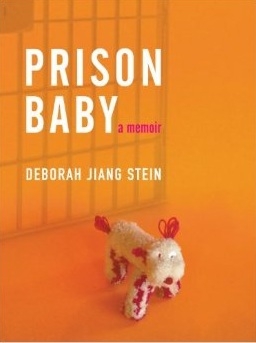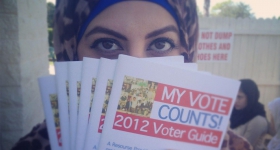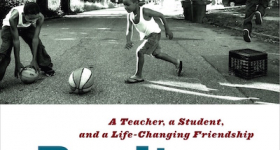No matter how many quotes people find from Eastern philosophers and
spiritual leaders about "happiness” to support the recent
commercial success of the happiness movement, I still
believe the chase for happiness is a contemporary Western idea that masks
a deeper search for purpose. Contentment and meaning, partnered with purpose, ultimately lead to
joy — and, in my mind, make for a fulfilling life.
It’s even revealed in the
history of each word. “Happy,” from the Old English and other European
word sources, at first meant “lucky,” and also "chance” and
“fortune.” The word “contentment," on the other hand, evolved from French and Latin:
from contentus, or “satisfied,” as one’s desires are bound to what
she or he already has.
Contentment is not a pursuit, then, as we are always on pursuit, especially here in the U.S. It’s a state of being. What’s better than finding joy just in
being? In my memoir Prison Baby, I
explore this idea.

Excerpt from Prison Baby:
Grief and uncertainty trapped me for most of my life. What if my
attempts to eliminate these two feelings had been my real prison?
Maybe I've asked myself the wrong questions all along. What if the fight
away from sorrow, fear, and uncertainty confines us into misery? A wall of fear and
resentment, not a bricks and mortar prison, had constricted me even though I
was free.
After all those years of anguish, maybe I needed to start asking, “What
can I do to feel deep contentment with life on life's terms?”
Beneath everything through which I'd struggled lay a path of seeking
happiness. I'd tried positive thinking, visualizing goals and
dreams, hypnotherapy, every self-help book and trend to transform myself,
change my thoughts and feelings -- and I learned much from all of it.
It's a multi-billion-dollar industry -- self-help and the happiness quest.
Maybe we're all hooked on a flawed goal. Like addicts in pursuit of the next
fix, looking for a quick-release. What if we change the premise?
Happiness appears then hides, a moving target, while contentment, when
we find it, is for keeps. My search for ways to ward off the discomfort of
uncertainty and sorrow -- the drugs, excessive drinking, the hop from relationship
to relationship, the marathon run away from my demons -- these kept me
locked up. Not my prison birth, not foster care, not my adoption, not the
racism and sexism around me, not my struggle about faith and spirituality, not
the bad relationships, not the worries of motherhood, not betrayal by family
members, not the stretches of poverty in my life, not the loss of a business,
and a home.
Even after I cleaned up and changed my lifestyle, my new world brought a
different kind of entrapment: overwork and a search for
perfection, happiness targets, and goals like excessive workouts at the
gym, the drive for more money, more property, more acceptance by my peers. More
more more. Always the yearn for what’s ahead, which is never enough if I always
steer away from the present moment.
No matter where we are, now is all we have.
The exact conditions I battled to avoid their grip -- loss, sorrow, and
uncertainty -- freed me to live fully, to taste life’s rich
flavors.
I continue to live with uncertainty, still in search of information
about my birth father and which boxes to check for race other than Multiracial.
I’ve now discovered through DNA tests I’m part Taiwanese. Added to Greek and
Latina, plus -- as my prison documents revealed -- a possible “one drop of blood,”
the archaic law about who’s considered black or biracial. Now, rather than an
outcast, I’m a perfect palette of paints, part of the new multiracial
demographic of one in five Americans multiracial by the year 2050.
Uncertainty, even about my race.
I had no idea how loss and pain, if grieved, could lead to contentment,
even if it took twenty years to mourn. Yes, I'm happy today and for no specific
reason at all, filled with joy. If I’m sad and sorrowful at times for whatever
comes about, in the same moments I can feel contentment and find humor and joy.
Sorrowjoy, because if we sit still inside and let it in, they live
together and we thrive.
***
Deborah
Jiang-Stein is a national speaker and founder of The unPrison Project
(www.unprisonproject.org) a 501(c)3 nonprofit working to empower incarcerated
women and girls with life skills and mentoring to prepare for a successful life
after prison. Deborah is the author of the memoir Prison Baby, published by Beacon Press. You can follow Deborah on
Twitter.









Comments